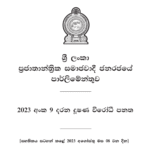Hattuwan Pedige Sugath Karunarathne Vs Hon. Attorney General
Case Analysis and Report: SC Appeal 32/2020
Case Overview: This case concerns Hattuwan Pedige Sugath Karunarathne (the accused-appellant-petitioner), charged with six counts of kidnapping and rape involving a minor girl under 16 years of age. The High Court of Anuradhapura initially imposed a cumulative sentence of 81 years rigorous imprisonment on the accused. The Court of Appeal upheld this decision, prompting a further appeal to the Supreme Court of Sri Lanka. The Supreme Court was tasked with determining whether the sentence imposed was excessive and in accordance with well-accepted principles of sentencing and justice.
Key Facts:
- Charges: The accused faced three counts of kidnapping and three counts of rape, allegedly committed between December 1, 2011, and February 20, 2012.
- Initial Plea: The accused initially pleaded not guilty but later changed his plea to guilty during the trial.
- High Court Judgment: The High Court sentenced the accused to 81 years rigorous imprisonment and additional penalties, including fines and compensation to the victim. The sentences were ordered to run consecutively.
- Court of Appeal Decision: The Court of Appeal dismissed the appeal, affirming the High Court’s judgment.
- Supreme Court Special Leave to Appeal: Granted solely on the question of whether the sentence was excessive and contrary to sentencing principles.
Supreme Court Findings:
- Violation of Fair Trial Principles: The court noted multiple procedural irregularities:
- The indictment was erroneously read to the accused twice, and the record lacked clarity on why the plea was changed from not guilty to guilty.
- The assigned counsel failed to cross-examine witnesses or raise significant issues regarding deficiencies in the prosecution’s evidence.
- The accused was virtually undefended, and his guilty plea seemed to stem from desperation rather than informed consent.
- Evidence Analysis:
- Medical evidence and testimony established only one instance of sexual intercourse (count 6). The other alleged incidents lacked sufficient evidence to support the charges of rape or kidnapping.
- Key elements for kidnapping, such as lack of guardian consent, were not established for counts 1, 3, and 5.
- Excessive Sentencing:
- The High Court imposed maximum sentences on all counts and ordered them to run consecutively without adequate justification.
- Sentencing failed to consider the accused’s guilty plea, absence of prior convictions, and mitigating factors, violating principles of proportionality and fairness.
- Application of Article 127 of the Constitution:
- The Supreme Court exercised its appellate powers to correct errors in fact and law, emphasizing the need to prevent miscarriages of justice.
Judgment: The Supreme Court quashed the convictions on counts 1, 2, 3, and 4 due to insufficient evidence. The convictions on counts 5 and 6 were affirmed. The court substituted the sentences as follows:
- Count 5 (Kidnapping): 4 years rigorous imprisonment.
- Count 6 (Rape): 14 years rigorous imprisonment.
- Sentences to run concurrently, reducing the total imprisonment period to 14 years.
- Fines and compensation ordered by the High Court were upheld.
Key Observations:
- Duty of Counsel: The assigned counsel’s lack of effective representation was highlighted as a significant failure that compromised the accused’s right to a fair trial.
- Role of the Judiciary: The trial judge was criticized for failing to ensure procedural fairness and not intervening to address glaring deficiencies in the proceedings.
- Prosecutorial Conduct: The prosecution’s inability to present conclusive evidence for certain counts and its failure to assist the court in ensuring justice were noted.
Implications: This judgment reinforces the principles of fair trial, proportional sentencing, and the judiciary’s role in safeguarding justice. It emphasizes the necessity for competent legal representation, thorough judicial oversight, and adherence to procedural safeguards.
Conclusion: The Supreme Court’s decision highlights the importance of balancing the gravity of crimes with fairness in trial and sentencing. By addressing procedural lapses and reducing the excessive sentence, the judgment serves as a precedent for upholding justice and ensuring that courts remain vigilant against potential miscarriages of justice.
Read Full Judgement














